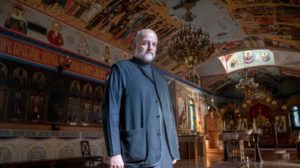Long Island Russian-Americans hopeful of Trump, Putin summit outcome
Despite controversies over Russia meddling allegations and the president’s meeting with NATO allies, those with ties to Russia hope for a long-term positive result.
The Rev. Serafim Gan is seen Monday at St. Seraphim Russian Orthodox Church in Sea Cliff. Photo Credit: Newsday/Alejandra Villa
By Craig Schneider craig.schneider@newsday.com
Russian-Americans on Long Island expressed hope Monday’s meeting between President Donald Trump and Russian Federation President Vladimir Putin would ease tensions between the two countries.
But given the questions over Russian meddling in the 2016 U.S. presidential election and other controversies, they were prepared to be disappointed.
More than the desire for any concrete policy achievement from the Helsinki summit, local Russian-Americans stressed their concern that the escalating acrimony between the two nuclear-armed superpowers could lead to something terrible. A congenial meeting between the leaders could help, they said.
Michael Dorfman is seen Monday in his Central Islip home. Photo Credit: Raychel Brightman
“I’m hoping it will lead to an improvement in relations,” said the Rev. Serafim Gan, the rector of St. Seraphim Russian Orthodox Church in Sea Cliff. “I don’t think it will be anything so negative. Either it will be a positive result, and an improvement in relations, or nothing will change.”
For his part, Trump emerged from his talks with Putin to say their meeting was a success.
During a joint news conference in Helsinki at the close of the one-day meeting, Trump sounded a conciliatory tone toward Putin. When a reporter from The Associated Press asked the president directly if he agreed with the U.S. intelligence community’s assessment that Russia interfered in the election, Trump answered that he “didn’t see any reason why” Russia would do it.
Last week, special counsel Robert Mueller’s team indicted 12 Russian military intelligence officers on charges of interfering in the contest between Trump and Democratic presidential candidate Hillary Clinton.
The meddling charges and widespread condemnation of Russia’s invasion of Crimea in Ukraine, served as background for the two leaders’ meeting, said Meena Bose, the Peter S. Kalikow chair in presidential studies at Hofstra University.
Beyond that, Bose said, the summit was held amid global recriminations of Trump’s contentious meeting with the U.S. allies in NATO and his ongoing congenial approach to Putin.
“Critics have raised concerns about Russia promoting its interest, and also questions about conferring legitimacy upon Russia when there are questions about Russia encroaching on the 2016 election,” Bose said.
In addition, the summit appeared to be a meeting to discuss areas of interest rather than decision-making, she said, noting that Trump and Putin sat down with almost no traditional preparation toward signing any kind of agreement.
Such summit diplomacy is unusual but not unprecedented, Bose said, especially when a new leader assumes power.
Christopher Shashkin, president of the Long Island/North Shore chapter of the Congress of Russian Americans, said he has felt increasing American animosity toward Russia keenly.
Shashkin said he hopes the success of the World Cup soccer competition in Russia — “millions of visitors, and no terrorist attempts” — set a positive tone for the summit.Putin arrives late in Finland for summit
Cooperation between the United States and Russia could help resolve major political challenges across the world, Shashkin said, such as reducing the illegal trade of drugs and weapons, while advancing efforts to reduce nuclear weapons.
“We seem closer to someone pushing a button now than during the height of the Cold War,” said Shashkin, 53, of Sea Cliff. “Any stepping away from that would be welcome.”
Shashkin said he did not take seriously Trump’s bluster at NATO leaders before Monday’s summit.
“Trump has a different day, a different tweet,” he said. “By today, he might have changed his mind.”
Michael Dorfman, 63, a writer in Central Islip, was born in Ukraine and came to the United States 18 years ago.
He said he understands that some people have negative opinions about both Trump and Putin. These people “are suspicious about all this,” he said.
Dorfman, who has written a book about Russian Jewry, said he believes the summit will play well among Trump supporters. Many of them view with suspicion the allegations that Trump colluded with the Russians to win the election.
Trump showed his disdain for such assertions by attending the summit, Dorfman said.
Moreover, to his supporters, Trump’s clash with NATO leaders showed his strength, that he is “the boss of NATO,” Dorfman said.
For all the controversy, Dorfman said, he remains hopeful.
“I hope they do something,” he said. “I hope they find solutions.”
With Kadia Goba

